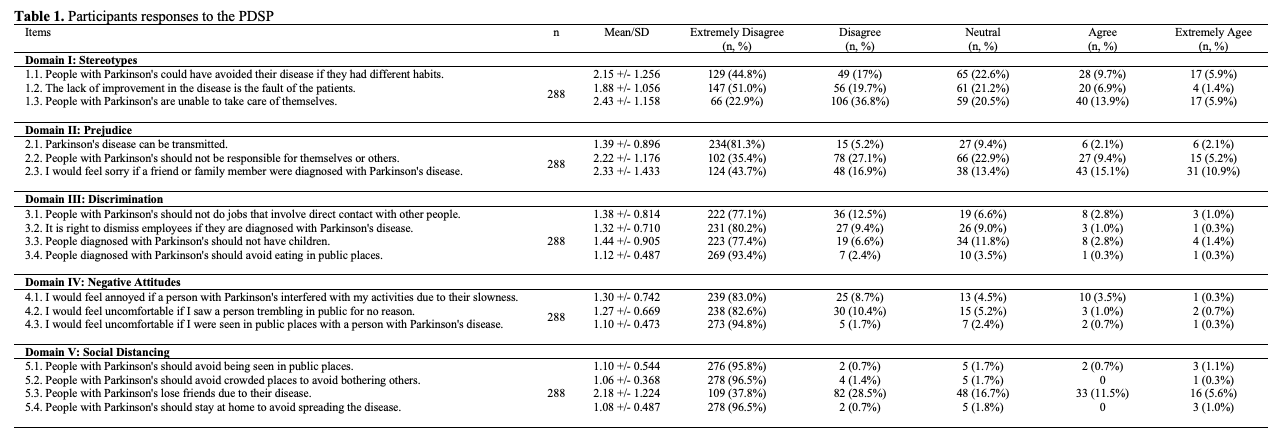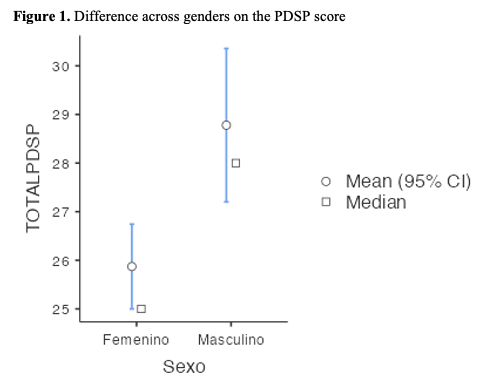Objective: This study aimed to: 1) identify factors associated with stigma towards people living with Parkinson’s Disease (PwP), and 2) analyze sociodemographic-based variations in the stigmatization of PwP.
Background: Parkinson’s Disease (PD) is a persistent neurological condition characterized by progressive degeneration, which tends to foster an environment where social stigma can thrive, leading to profound psychological and social consequences for PwP.
Method: A cross-sectional, nationwide, exploratory study was carried out across 25 states of Mexico. The Parkinson’s Disease Social Stigma Perception Scale (PDSP), developed by our own team, was used to evaluate social stigma towards PwP within the general population through five domains: (i) stereotypes, (ii) prejudice, (iii) discrimination, (iv) negative attitudes and (v) social distancing [table 1]. Mann-Whitney U and Kruskall-Wallis tests were conducted to examine variances between groups and a multivariate linear regression model was used to assess predictors of stigma utilizing demographic data (age, gender, education level and residential types).
Results: Among the 294 participants who completed the survey, those with missing data (n=6) were excluded from the analyses. The mean age of respondents was 38.3 years, and 70.1% were women. Average years of education was 16.5 years and 44.4% of the sample knew a PwP. For the whole group, being a female showed a significant correlation of lower stigma (p < .001) [figure 1], and between Gen X and Gen Z for domain i (p 0.015). Spearman’s Correlation showed significant results for years of education and lower PDSP scores (rho -0.131, p 0.026).
After a multivariate linear regression analysis, female (B=-2.8280 [95%CI -4.500 to -1.156], p = <.001), years of education (B=-0.3978 [95%CI -0.625 to -0.171], p = <.001) and age (B = 0.0551 [95%CI 0.004 to 0.106], p = 0.033) remained associated with the stigma [table 2].
Conclusion: The study’s findings suggest that gender, age and educational levels could be associated with variances in stigma towards PwP.
Table 1
Figure 1
Table 2
References: 1. Parkinson’s Disease Social Stigma Perception Scale (PDSP): Development and Pilot Study Of A Measurement Scale – abstract presented at the IAPRD World Congress 2024 in Lisbon.
2. Hanff A-M, Leist AK, Fritz JV, Pauly C, Krüger R, Halek M, et al. Determinants of self-stigma in people with Parkinson’s disease: A mixed methods scoping review. J Parkinsons Dis [Internet]. 2022;12(2):509–22
3. Stopic V, Jost ST, Baldermann JC, Petry-Schmelzer JN, Fink GR, Dembek TA, et al. Parkinson’s disease stigma questionnaire (PDStigmaQuest): Development and pilot study of a questionnaire for stigma in patients with idiopathic Parkinson’s disease. J Parkinsons Dis [Internet]. 2023;13(5):829–39
4. Verity D, Eccles FJR, Boland A, Simpson J. Does perceived control mediate the relationship between stigma and well-being for individuals with Parkinson’s disease? J Neurol Sci [Internet]. 2020;414(116841):116841
To cite this abstract in AMA style:
AL. Guerra-Anzaldo, WF. Moguel-Cardin, A. Domínguez-García, AJ. Hernández-Medrano, G. Rivera-Monroy, K. Velázquez-Román, RJ. Baños-Betancourt, C. álvarez-Hernández, DP. Romero-Terán, KI. Sánchez-Ramírez, M. Rodríguez-Violante, A. Cervantes-Arriaga. Stigmatizing Attitudes Towards People With PD Using The Parkinson’s Disease Social Stigma Perception Scale (PDSP): A Nationwide Study [abstract]. Mov Disord. 2024; 39 (suppl 1). https://www.mdsabstracts.org/abstract/stigmatizing-attitudes-towards-people-with-pd-using-the-parkinsons-disease-social-stigma-perception-scale-pdsp-a-nationwide-study/. Accessed July 5, 2025.« Back to 2024 International Congress
MDS Abstracts - https://www.mdsabstracts.org/abstract/stigmatizing-attitudes-towards-people-with-pd-using-the-parkinsons-disease-social-stigma-perception-scale-pdsp-a-nationwide-study/



